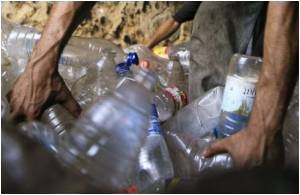Fungi may help provide an eco-friendly way of decomposing polycarbonate plastic waste containing bisphenol A ((BPA), two Indian scientists have revealed.

Polycarbonate is an extremely recalcitrant plastic, used in everything from screwdriver handles to eyeglass lenses, DVDs, and CDs.
Some studies have suggested that the BPA may have a range of adverse health effects, sparking the search for an environmentally safe way of disposing of waste plastic to avoid release of BPA.
The scientists pretreated polycarbonate with ultraviolet light and heat and exposed it to three kinds of fungi - including the fabled white-rot fungus, used commercially for environmental remediation of the toughest pollutants.
They found that fungi grew better on pretreated plastic, using its BPA and other ingredients as a source of energy and breaking down the plastic.
After 12 months, there was almost no decomposition of the untreated plastic, compared to substantial decomposition of the pretreated plastic, with no release of BPA.
Advertisement
Source-ANI
SAV









